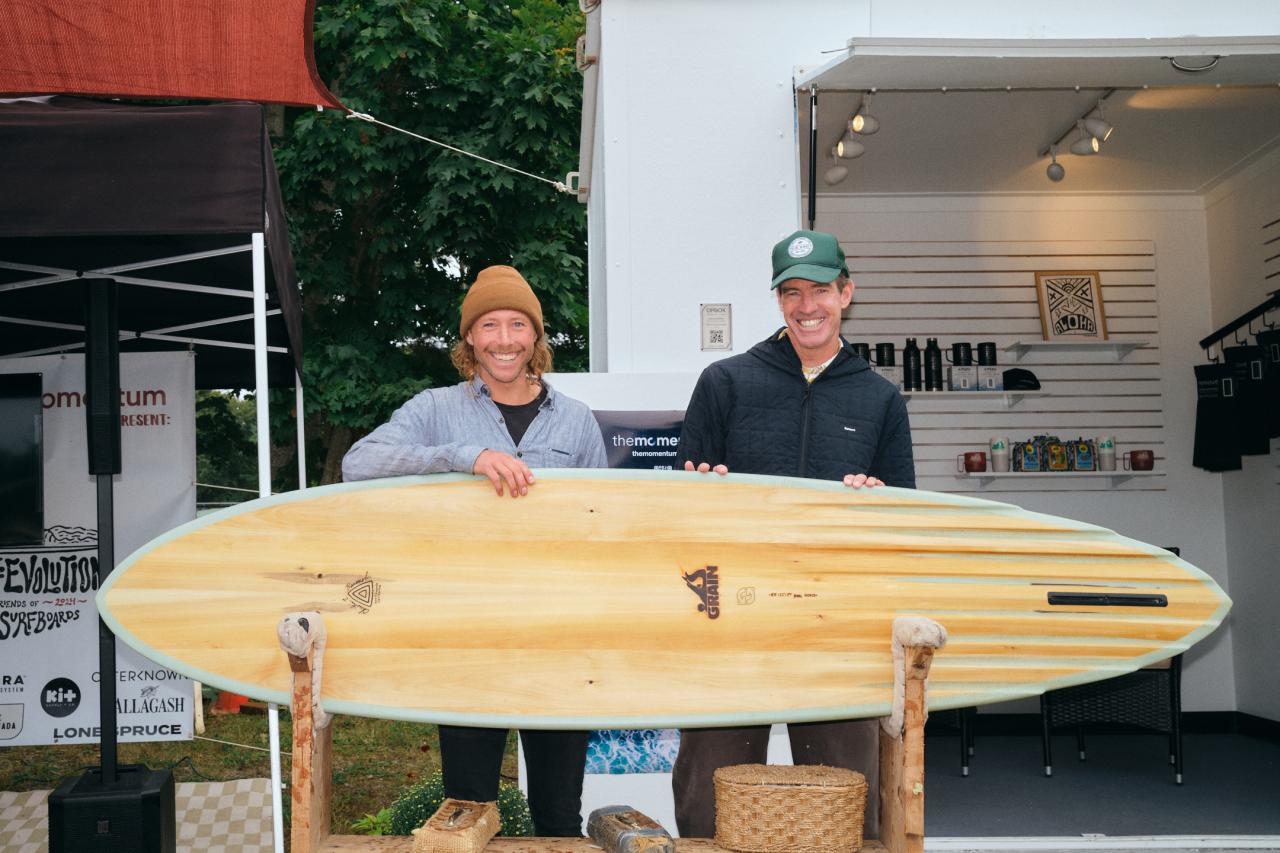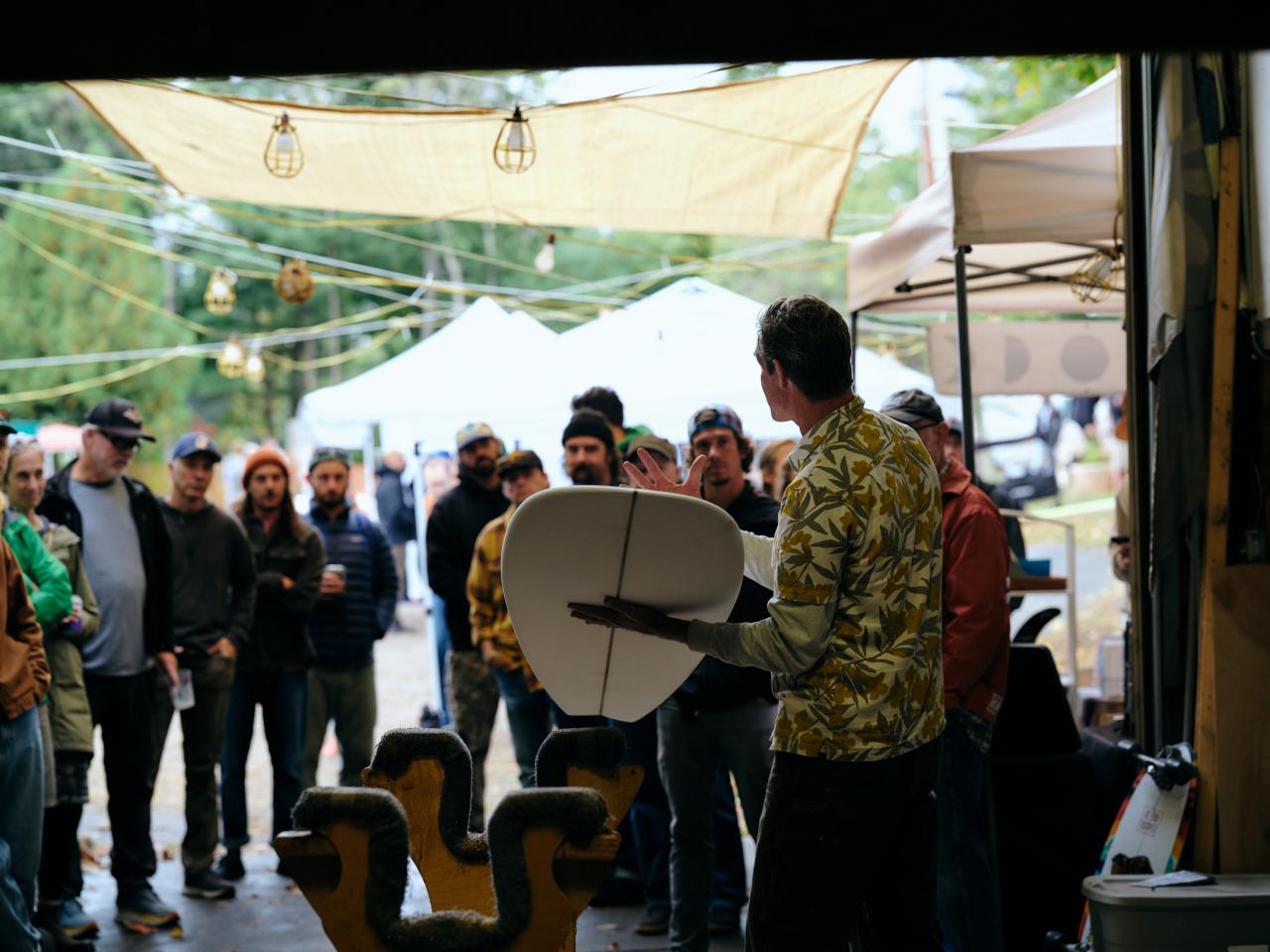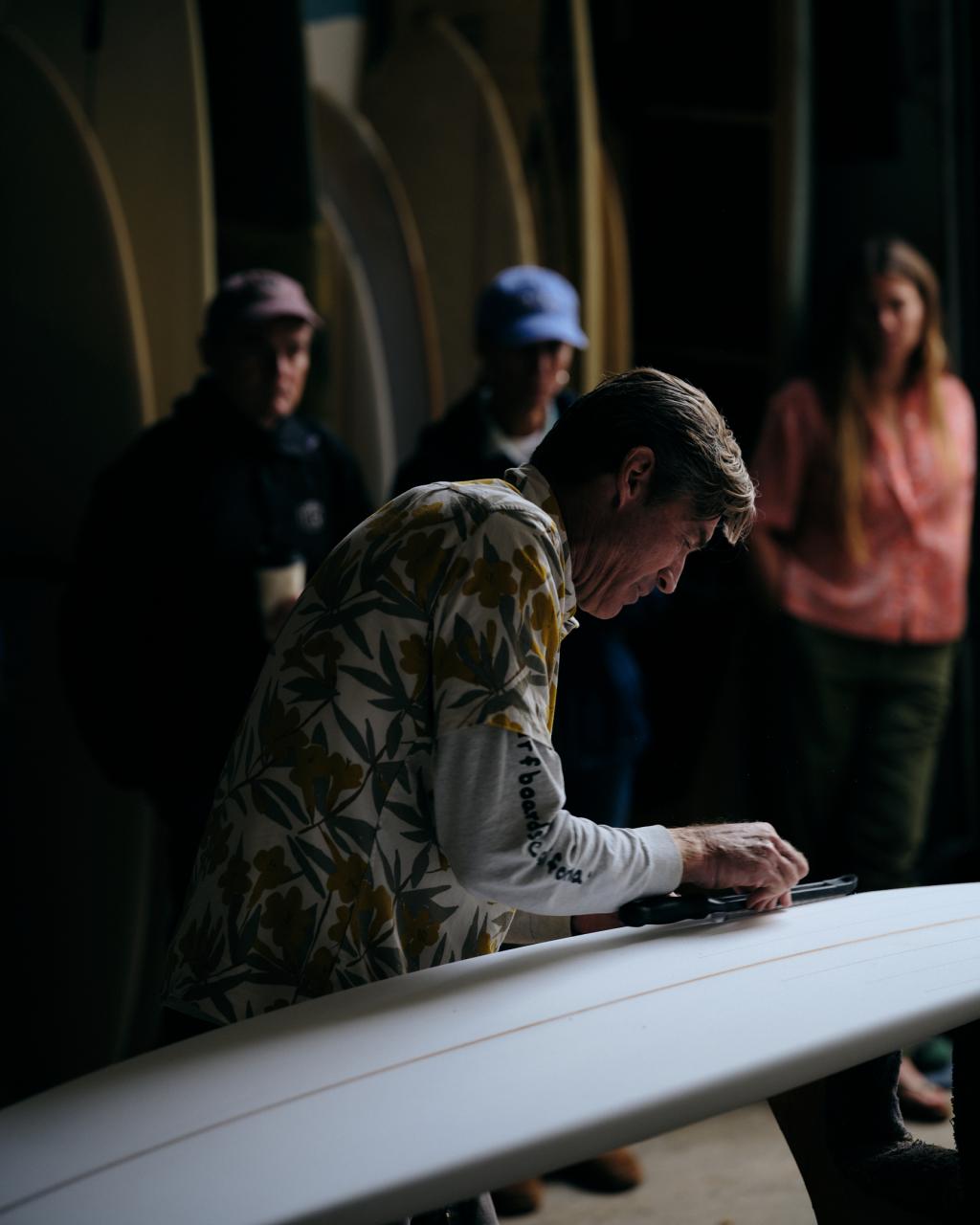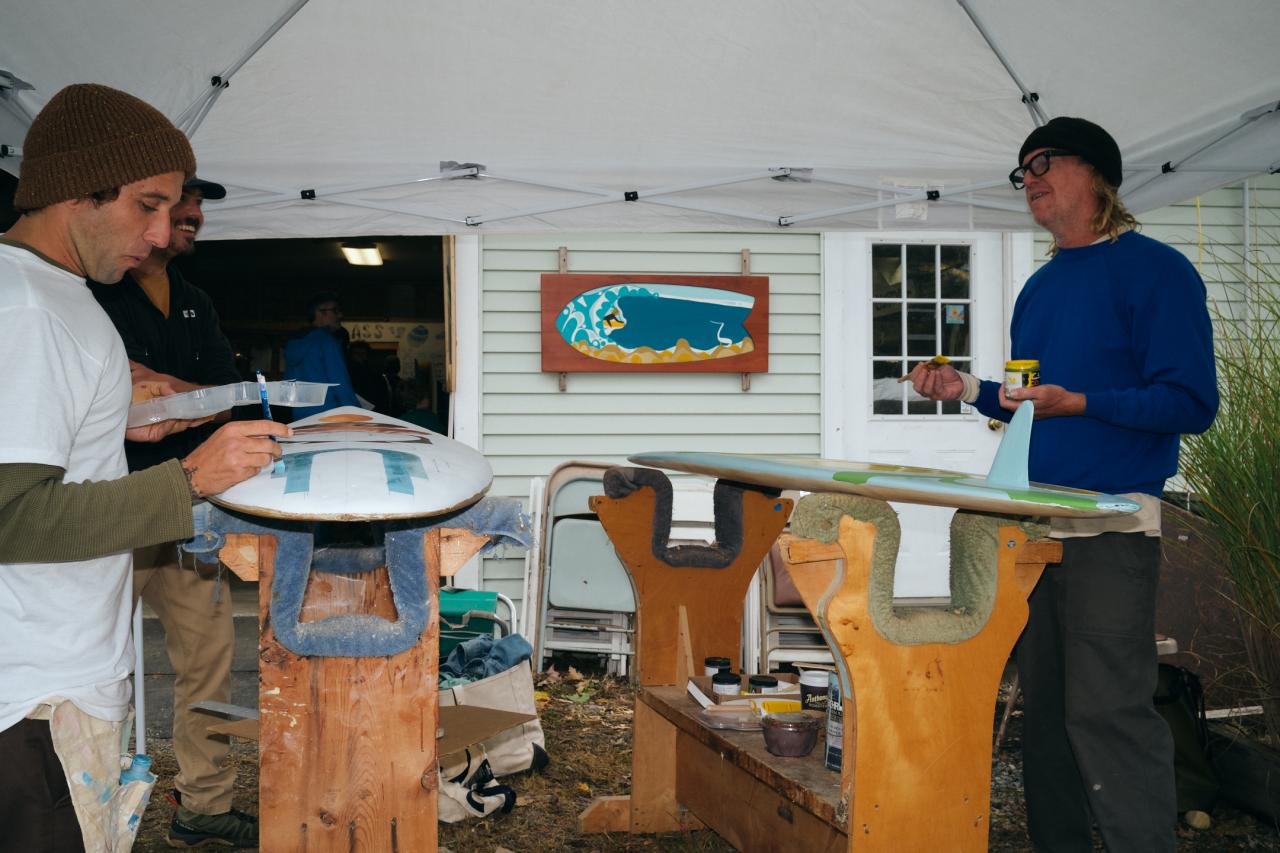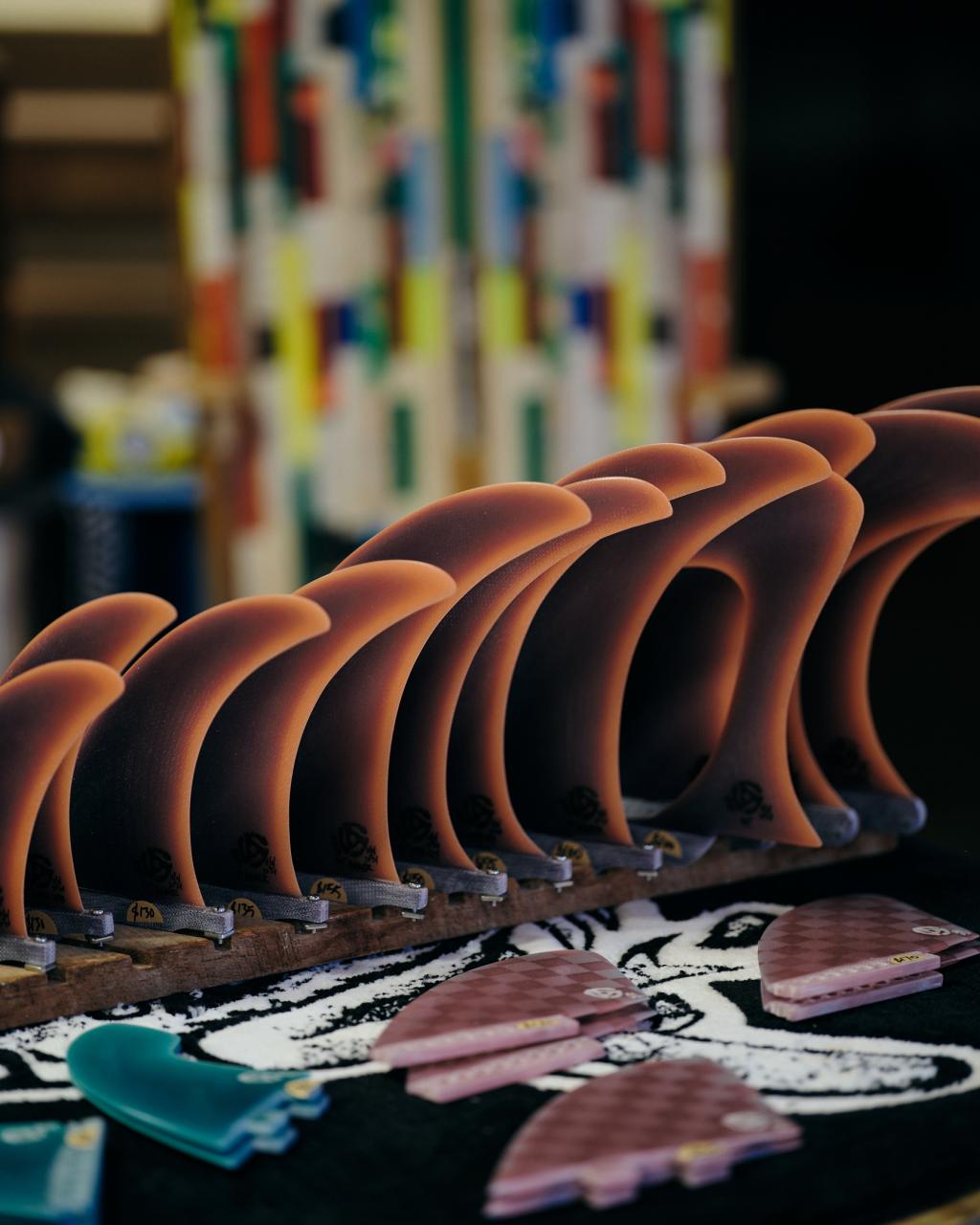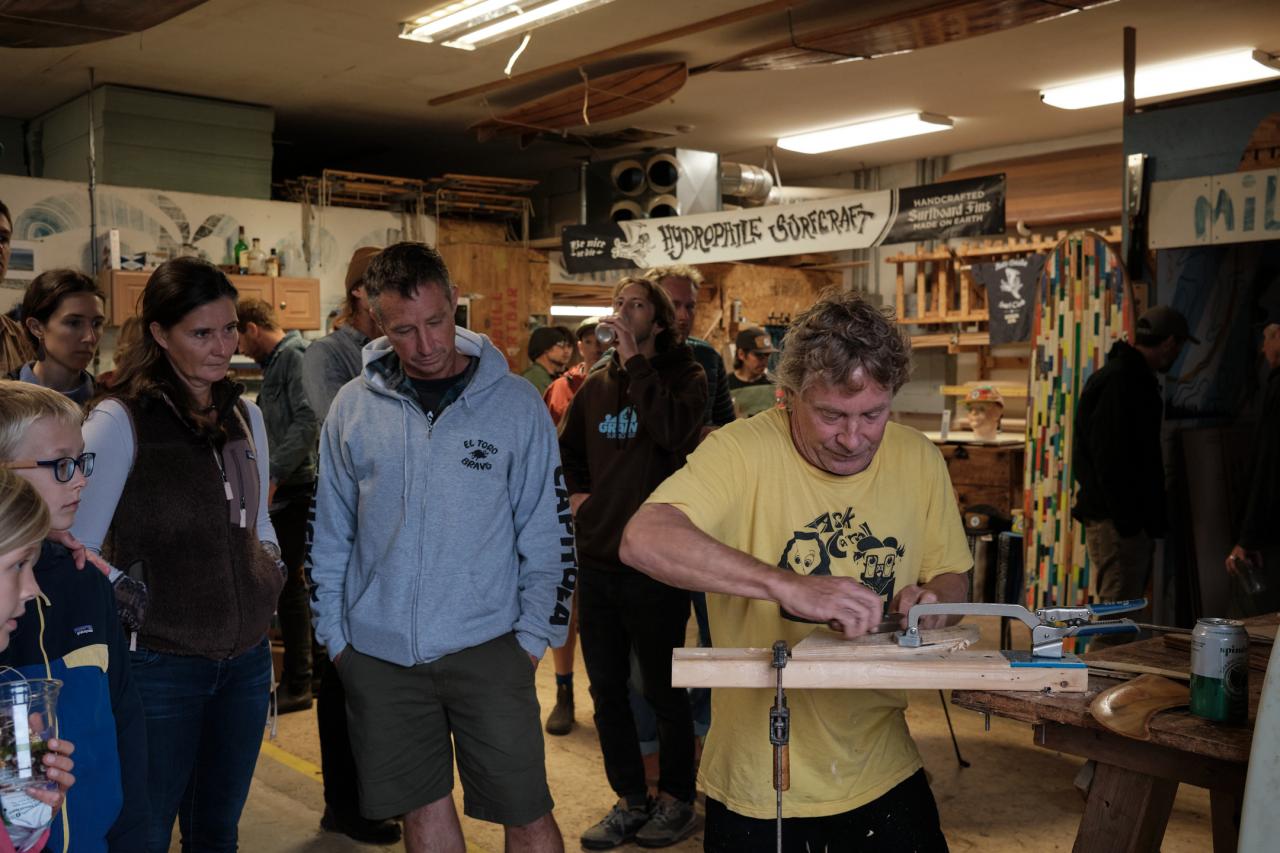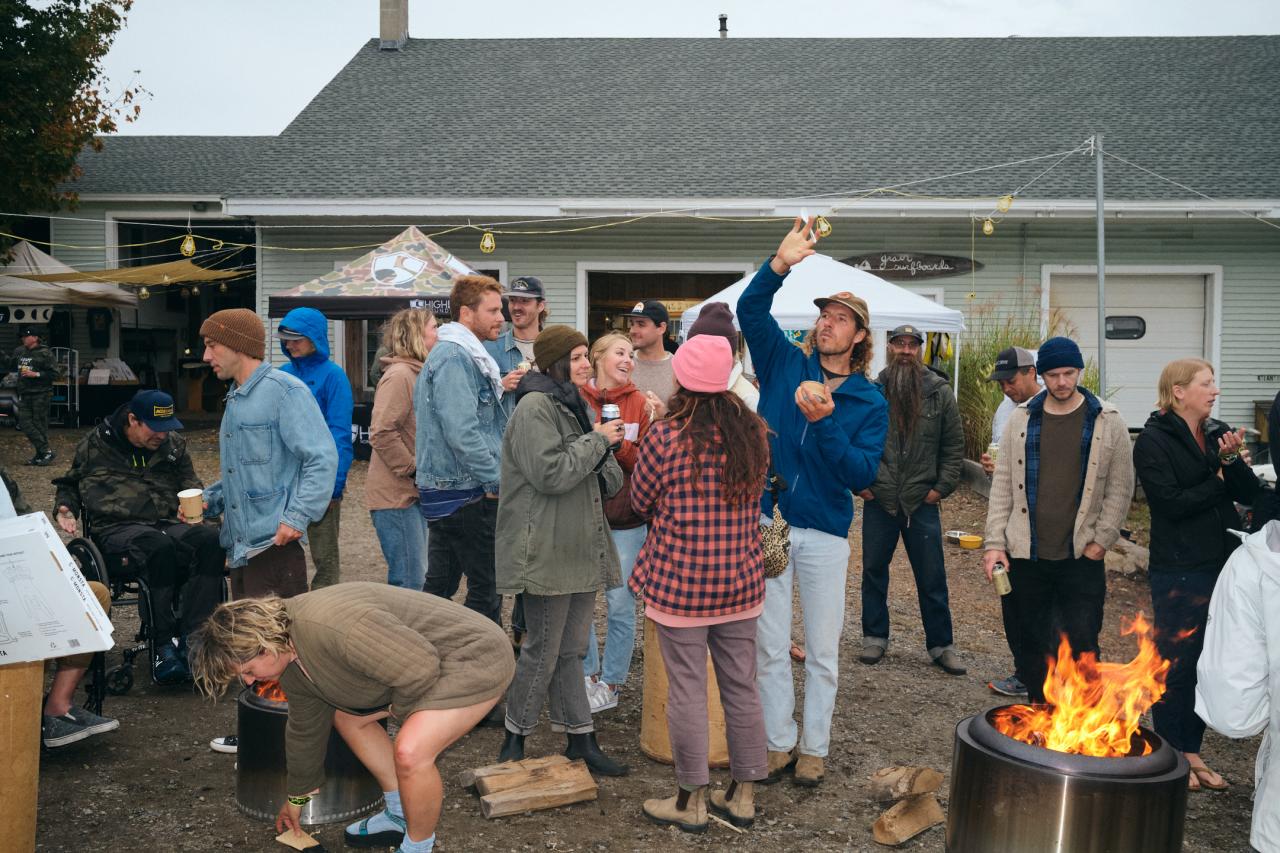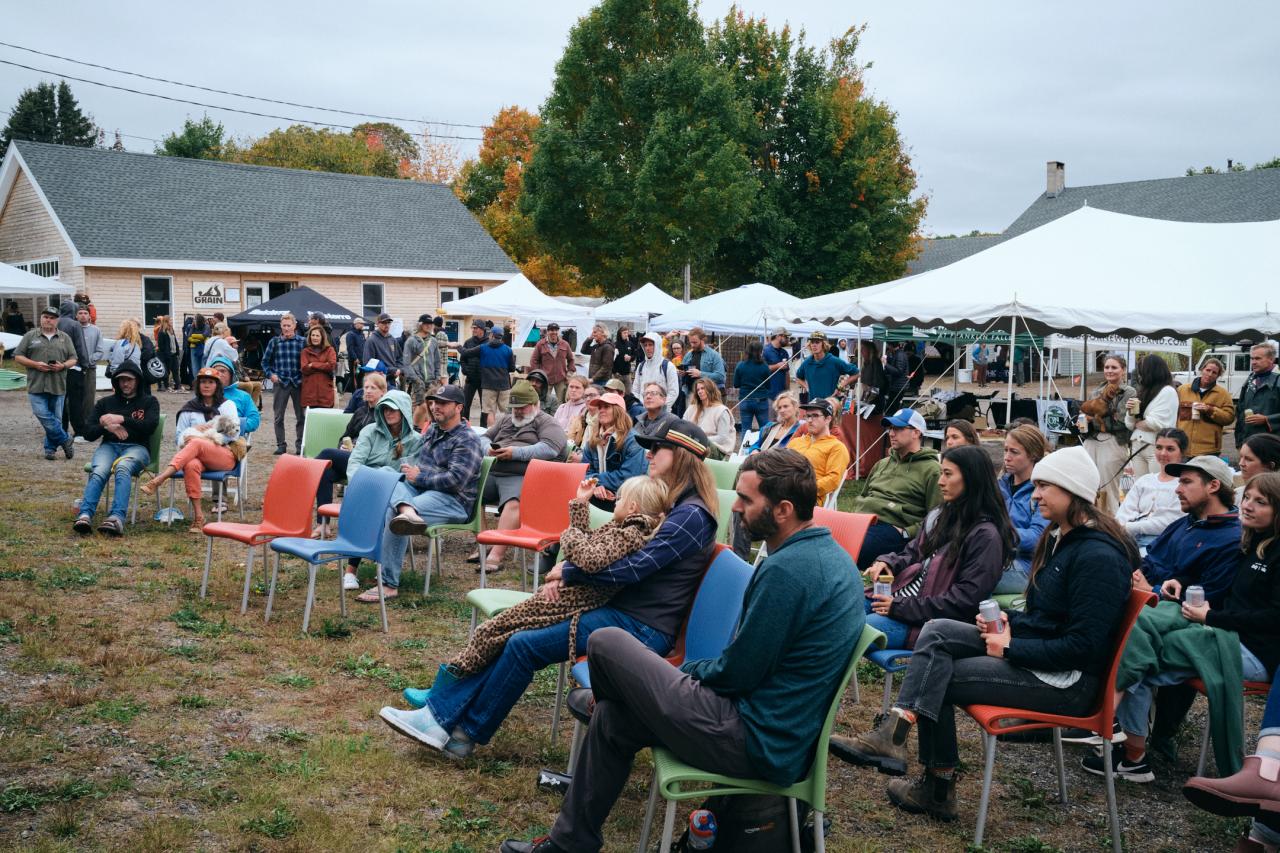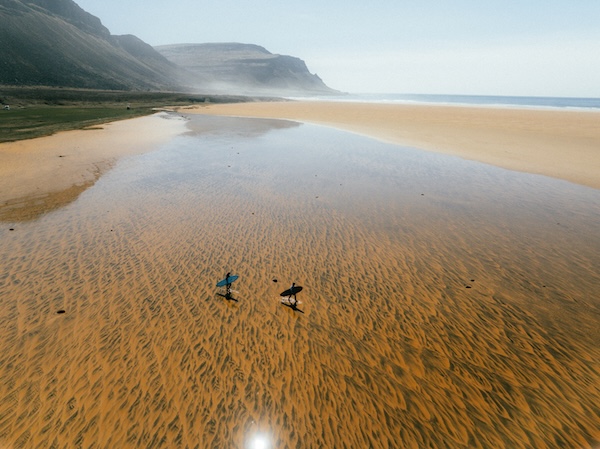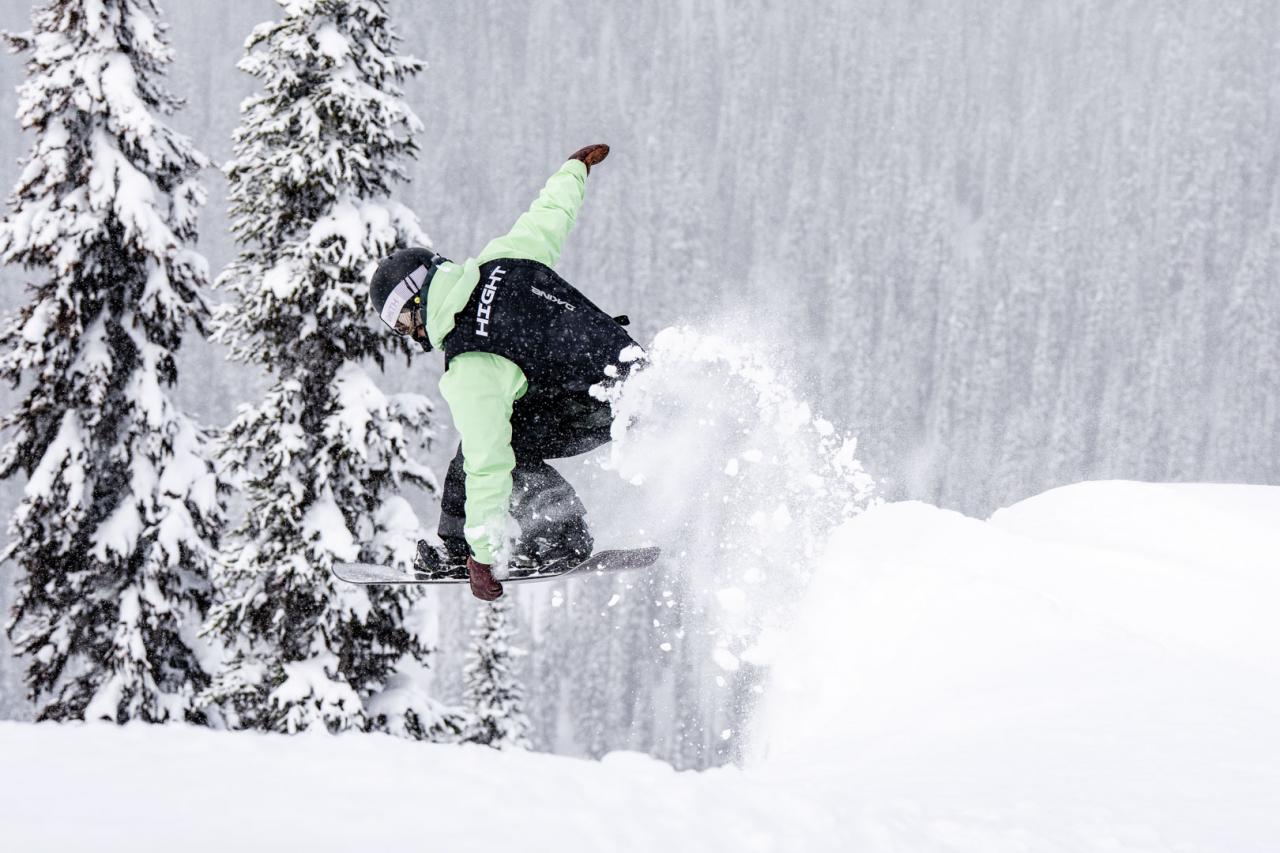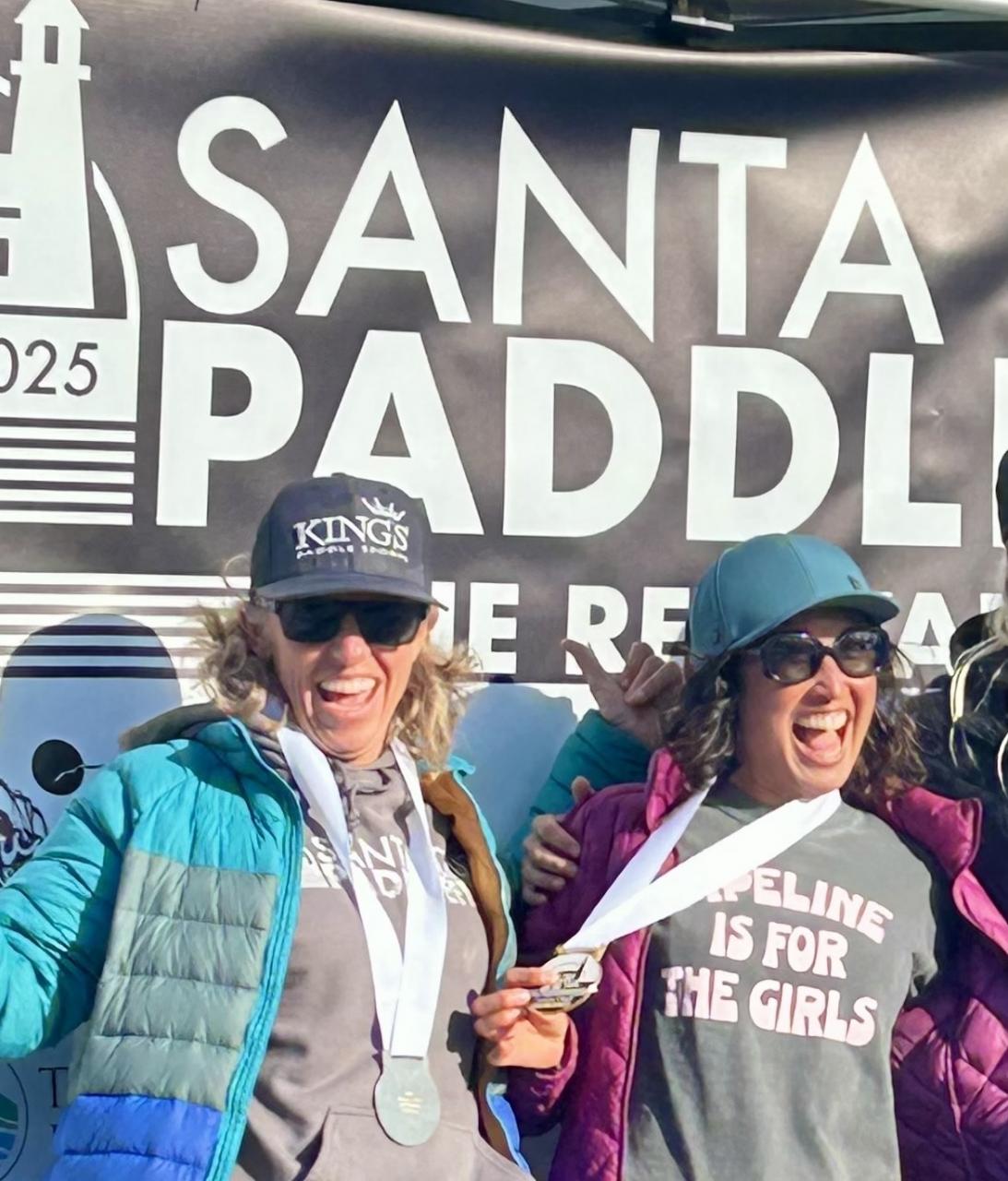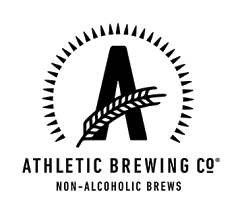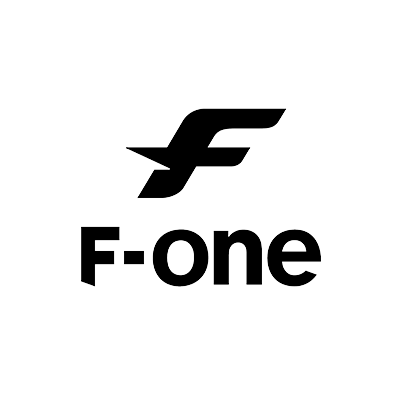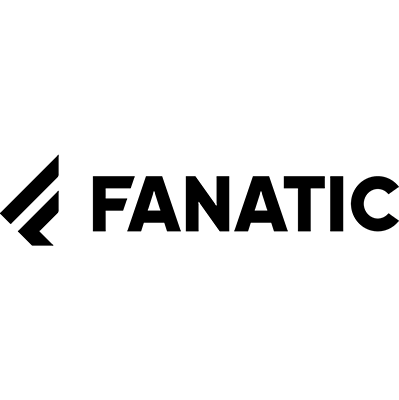The first moment I arrived on the property, I knew something very different was going on here. Grain Surfboards sits on several acres of land in York, Maine and consists of a repurposed produce warehouse and a newly built showroom with ample outdoor space. On this day, that space was filled with hundreds of people gathered for the annual Grain Surf Re-Evolution Festival. I was deeply intrigued by this turnout I had not expected.
Not only were there multitudes of people roaming through the space on a cold and rainy day in September, but all participants were gathered in specific support for the sustainable surf brands that had migrated here as vendors for this special event. To be invited to show your brand at the Surf Re-Evolution at Grain means a few things: your brand is super sustainable/ regenerative, you have an interactive installation at the event that gets the community involved and, also, you must be a good time to be around.
“It’s gone through a lot of different iterations over the last thirteen years,” recalls Mike LaVecchia, founder of Grain. “But from the very beginning, we wanted this to be a party with a purpose.” With that intention, the surf community agrees that they have nailed it. Every brand on the property at Grain Surfboards on this day holds a specific mission in helping the culture and ecology of surfing where they live. Each brand also has a mission to enjoy life as much as possible while doing so. Everywhere you looked during the Surf Re-Evolution festival, one saw people immersed in a combination of genuine conversation and elated laughter. These are a few of the key ingredients to Grain Surfboards and the Surf Re-Evolution Festival.
At this point you may wonder what the difference is between a revolution and a Re-Evolution. A revolution is a visceral revolt against something oppressive so that something new can take its place. A re-evolution is an elevated awareness that reflects back upon itself and regenerates itself more clearly into what it really is. The first is consciously destructive. The latter is consciously creative and regenerative. One divides communities, the other unifies them.
Grain created the Surf Re-Evolution Event, a gathering that unites sustainable surf brands in a format that is half expo, half surf festival. The community that has assembled around Grain is the embodiment of the phrase Re-Evolution. Once I got a chance to peek inside the Grain brain, to speak to the team who built this community culture, I realized that community is built into the DNA of these people who make it possible. The course of evolution for Grain Surfboards and their Re-evolution festival is organic to the essence, emerging into our world as naturally as a seed, beginning small and growing slowly, before ascending into a tree.
The day after the festival, the Grain surfboards property held an entirely different energy. Now it was just the core crew working to clean up from the event, and everyone moved at a calm, leisurely pace, a reprieve from the churning energy of the weekend. They transitioned between moving things to standing around, talking, reminiscing and, more often than not, laughing. It was in this calm after the storm that I got to sit with the Grain team, a team that is more like a family. In fact, many of them are actually family.
Mike and Nick LaVecchia are two brothers who, along with an incredible group of partners and friends, worked together to get the brand off its feet; they are two branches on the original trunk that has become the Grain Surfboards' family tree. Where Mike is responsible for running the business and developing the materials and building methods that are core to Grain, Nick put forth his efforts towards photography, web development, and marketing the brand.
While the brothers were raised in New Jersey, where they found their love of surfing and board sports, it was the draw of the mountains that began the journey. Mike got a job with Burton Snowboards in the early 80’s in Vermont. He was one of their early employees and a key figure in the beginning of the snowboarding renaissance of that time. A few years later Nick joined Burton as well doing design work for them.
As the snowboard industry evolved, Mike began to get a calling to one of his childhood passions, boat building. “I’ve always loved everything maritime since I was a kid in Jersey,” Mike recalls. He went from Burton to being hired by the Lake Champlain Maritime Museum to be the project coordinator in creating a scale replica of a sunken ship. This was a four-year process to build the vessel and what’s amazing is the wild way organic evolution weaves us through the world. It is because of that boat building in Vermont that Mike and Nick LaVecchia were brought to Maine.
The museum hired a famed boat builder from York, Maine named Paul Rollins. Paul helped with the construction of the massive replica. When it was finally finished, the replica became a floating maritime museum that traveled the coast, entertaining and educating people. Mike's love of surfing took off around the same time, so he left the position with the museum to move to Maine and began working on boats with Paul, whom he had originally brought to Vermont.
It was building boats out of wood with Paul that made Mike ask himself a crucial question: Why was he still paddling out to surf on a board made entirely of toxic material when he spent all day building a vessel out of wood? Around the same time that Mike asked himself this, the boat building work began to slow down and Paul no longer needed him. So, Mike made a courageous decision. He stopped working, took out a five-thousand-dollar loan from a local credit union, and began building his first wooden surfboard.
Mike built his first wooden board, and to his surprise, friends and family began asking him to craft one for them as well. Soon, a growing group of friends and supporters worked together creating the brand and website for what is now Grain Surfboards. And then, just as organic evolution unfolds when conditions are right, there is a massive burst forward that propels a sapling to a tree. That’s what happened next.
At the very same time that Mike was scaling up in building wood boards, Clark Foam, the leading manufacturer of foam blanks for surfboards world wide, closed. This caused massive changes within the surf industry because Clark Foam was the institution that supplied 99% of all surfboard blanks across the globe.
Mike was interviewed for an article by a publication. The article went viral globally (before that was a thing), comparing the closing of the toxic material supplier, Clark Foam, with the opening of the sustainability built surfboards at Grain Surfboards. This article made its way across Europe, China, Japan, South America, Australia and around the world. Before the team knew what happened, phones began ringing off the hook and what began as a passion project became a full-time profession. Though having a fairly booming business was a good start, that wasn’t what the growing Grain crew was really after. Whether consciously or unconsciously, what they wanted was to create a real community surf culture and that’s where the Re-Evolution began.
The first event was marked by a simple but impactful moment when several of the Grain crew, along with Jon Wegener and Ed Lewis found themselves tucked away in the glassing room, collaborating on a very unique surfboard that they all had a hand in. Jon Wegener is an innovator in the sustainable board building space and Ed Lewis creates beautiful handplanes from recycled materials. Seeing the community come together to build boards with their hands, the crew knew that they had to continue creating this sort of atmosphere in order to build community. From that inspiration blossomed the fruit of an annual event that has grown along with each iteration of Grain.
Through the genesis of Grain Surfboards, Grain has held four spaces. What began in a basement has now culminated in a repurposed Produce Farm that once belonged to the Johnson family, the family of Nick LaVecchia's wife. In fact, the factory where they now build boards originally housed a train car that was once a industrial refridgerated car used to store the Johnson Family produce. It is beautifully cyclical that a produce farm became the home of a sustainable board building institution. As the space of Grain grew so did the extension of the Re-Evolution Festival.
Of course, as Grain and Surf Re-Evolution expanded, so did the Grain Family. There are many people who have contributed to this thriving business and overall culture but two stick out - to me anyway - as solid branches of the family tree. First you have Nolan Collins, a super talented, young gun surfer who has become a guru of wood board building. He is the individual producing large amounts of the craftsmanship coming out Grain’s doors and he currently teaches many of the workshops and classes.
Next, there is Allie Wormel, who resides on the property with her partner and two children. Allie is the Creative Director for Grain. She organizes, amplifies and propels forward all the events that make Grain such a special surf epicenter. As for Surf Re-Evolution, Allie is the head organizer, weaving a magical balance between curating a well-structured event, while still allowing for the free flow that makes the day feel like a festival. In her words the whole purpose of Re-Evolution is, “Bringing the right people together to meet, collaborate and create solutions.” Gotta love that.
Now in its thirteenth year, the Re-Evolution festival coalesces and coheres the community culture that has been steadily expanding. This September of 2024 was my first time at the event, but from the very moment I stepped on the land, one thing was obvious: the people of this tight community were committed. They attend the festival, they attend smaller events, they attend board building workshops, they purchase kits to bring home and build boards on their own. They build the boards, use the boards and surf them together.
This is a true culture, one that is completely rooted in regenerative sustainability. This true sustainability is inspired by simple common sense.
As Mike puts it, “We’ve been using the same mill and the same mill men, a father and son, since the beginning in 2005. We use wood that is local to Maine. We know the people and the wood that we are using and it’s all from right around here. It’s not toxic to us or the ocean. And when we shape boards we can talk and listen to music, because we are assembling pieces of wood instead of mowing foam. It just feels better and it makes more sense.”
The simplicity of this notion is actually profound. Being truly sustainable is an act of common sense. It is all about being connected to the place where you live, the environment, and utilizing its resources in a way that regenerates the world instead of depleting it. It is about working with the people and places that you love and live in.
After leaving Grain and the Surf Re-Evolution festival, a new phrase made its own organic evolution in my mind: Sovereign Reciprocity. To be complete within one’s self and able to give and receive in balance and harmony. This is what it really means when we speak about sustainability. It starts with us as being sovereign as individuals and then spreads to our family and community through reciprocity. Honestly, the seed to be planted through this story is not to go to Grain and Surf Re-Evolution necessarily, but rather to look around you, get off the phone, get back into nature and create a community culture that embodies sovereign reciprocity. This is the kind of Organic Re-Evolution that can help us build more than just boards; it’ll help us build a bridge to a more beautiful reality.
PC: Nick LaVecchia

